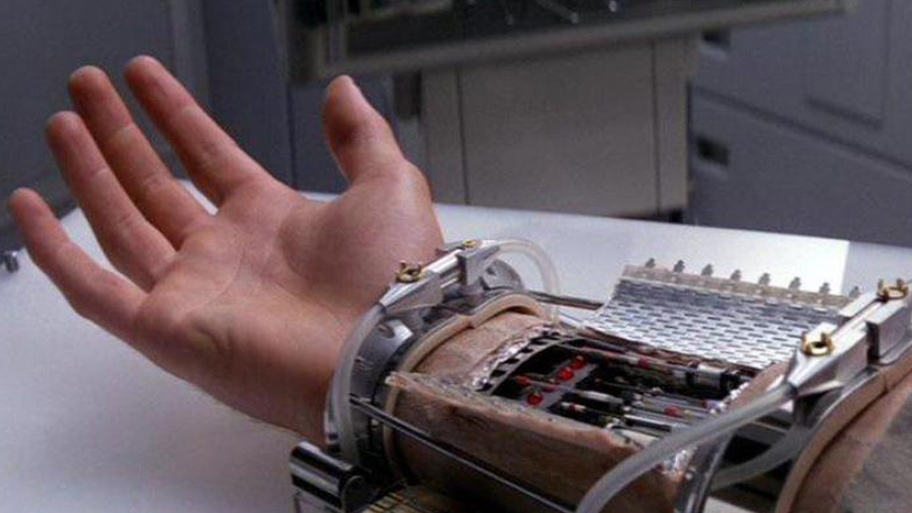
Ever wished you could simply drive home sober after a night out on the town? Or perhaps you're struggling to kick those filthy cigarettes? Science has the answer.
Plus, if you've lost an appendage you may soon be able to replace it with robot hands that can genuinely feel like your own skin, just like Luke Skywalker.
Star Wars-style cyborg hands are just around the corner -- This week researchers from Switzerland have shown off plans to attach the first bionic hand with real-time nervous feedback built in. The robot hand will be attached to the patient's median and ulnar nerves in his forearm, allowing him not only to control it via thought, but to actually feel the hand via skin sensors on its fingers and palm. If all goes well, we could have a Luke Skywalker-style robotic hand ready to upgrade or replace your own, sooner rather than later. [AAAS]
A magic sobering-up pill -- Wouldn't it be nice at the end of a night to be able to pop a pill, instantly sober up, and drive home? Sounds like science fiction, but researchers have developed a new complex of enzymes, packed up in a nano-capsule, to create a new tiny pill that dramatically reduces blood alcohol levels in mice. Further testing is obviously required, but the nano-capsule enzyme concept shows serious promise for both dealing with alcohol overdoses, and other enzyme-treatable diseases. [Nature Nanotechnology]
Girls really are better at languages than boys -- It's commonly noted that girls pick up languages quicker and more easily than boys, and now scientists think they've found the reason. A study showed that a gene called FOXP2, thought to be involved in speech and language formation, was found in higher concentrations in the brains of girls over boys. More studies are required due to the small sample sizes, but the results could explain why girls often speak first. [Science]
A genetically engineered tastier tomato might be on the way -- The genetic code of the humble tomato was published last year; since then scientists have been looking at what makes certain tomatoes taste better than others, and why mass produced tomatoes are bland. Essentially, what they're doing is taking the flavourful chemical-producing genes and inserting them into the genomes of high yield, mass-produced tomatoes, giving you the best of both worlds. It's a long road, but a tastier tomato could be heading your way sooner rather than later. [ScienceNOW]

Life, as we know it, might have been bleached out of existence on Mars -- The reason we haven't found the signs life on Mars yet, might not be because it's not there, but because it's actually been bleached away. Scientists studying a meteorite from Mars, that was discovered frozen in the Antarctic ice, have discovered chloride compounds and other chemicals commonly associated with cleaning agents like bleach. Coupled with what the Phoenix Mars lander found, it indicates that the surface of Mars might be covered in bleaching agents that could have eradicated signs of carbon-based life. Martian life might have existed, but it looks like we might never find it, thanks to the celestial cleaners. [New Scientist]
Sign up for breaking news, reviews, opinion, top tech deals, and more.
Immune boosters could help stop the new viral killers before they kill you -- The emergence of new deadly viruses, like the coronavirus that's recently hit the news in the UK, and SARS, has prompted researchers to delve into new ways to help kill off the bugs once you become infected. A study has shown that immune boosters, proteins that enhance the action of your own immune system, are effective in reducing the number of infected cells. Type I and III interferons could be the difference between stopping outbreaks of the deadly viruses, and the world turning into a real-life game of Plague Inc. [mBio]
That's no moon, it's a planet -- We commonly think of planets as pretty big things, but astronomers using NASA's Kepler telescope have found the tiniest world ever, some 210 light-years from Earth. Kepler 37b is one of three planets orbiting a Sun-like host star in the Lyra constellation, and is only 10 per cent larger than our Moon. Considering our own planet Earth is a bit on the titchy side, maybe good things do come in small packages. [Nature]
Trying to quit smoking? E-cigarettes might be the answer -- There are loads of different aids to help you ditch the habit, but British regulators are looking to add another, possibly more effective, method to the approved list. The government is looking at regulating e-cigarettes as medicine, meaning they can be prescribed by doctors. E-cigarettes allow you to adjust the amount of nicotine taken in with each inhalation, and eliminates the tar and carcinogens associated with traditional cigarettes by using electronic vaporisers instead of burning tobacco leaves. In theory, you can gradually reduce the amount of nicotine in each puff until you're weaned off the addiction. Just remember to keep it charged up. [New Scientist]
